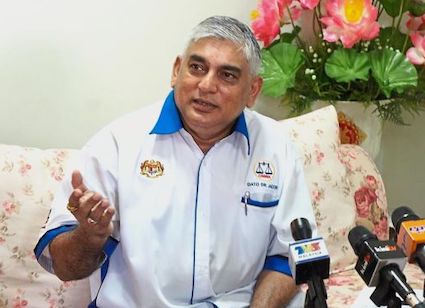Consumer group pans Selangor’s move to restrict free water to B40 group

Jacob asked if the move had anything to do with the government’s takeover of Syarikat Pengeluar Air Selangor Sdn Bhd (SPLASH) earlier this year, and whether it was due to higher costs in manning the water industry.
(FMT) – The Consumers Association of Subang and Shah Alam, Selangor (Cassa) has strongly criticised the state government’s decision to give only the bottom 40 (B40) group free water, calling it “despicable” and a betrayal of trust.
Speaking to FMT, Cassa president Jacob George said the announcement by Selangor Menteri Besar Amirudin Shari during the debate of the state’s 2019 budget last week was a “manipulation of its promise to be ‘mesra rakyat’” (for the people).
“We need to ask whether the proposal is ethical and moral, or if it is a betrayal of the trust given to the state government when they took over Selangor and pledged to be ‘mesra rakyat’ and provide this facility.
“It is despicable that the whole proposal is being manipulated and withdrawn to only take care of the B40. They are not the only community in Selangor struggling with higher costs of living,” Jacob said.
Amirudin told the Selangor state assembly last Friday that while every segment of society received the free water sponsored by the state government, the rationale of the programme was to alleviate the burden of the B40.
The Sungai Tua assemblyman said the B40 would be classified as those registered in the e-Kasih system. He added that the move would save the government some RM105.2 million in costs.
“The state government is confident that the B40 group deserves and will appreciate the free water more than others.
“So we have agreed to increase the amount of free water for them from 20 cubic metres a month to 25 cubic metres a month,” he said.
However, Jacob asked how the state government would determine whether individuals were in the B40 group or the middle income (M40) group as there were no “proper” statistics to distinguish between the two.
He gave the example of an unemployed couple living in a well-to-do property bought many years ago, who were surviving on their pensions, asking if they would be considered as B40 or M40 given their immediate past income.
“We cannot withdraw a privilege to a state without proper consultation with stakeholders,” he said, adding that his group, which represents consumers in Selangor, had yet to be consulted over the move.
Jacob, who has over 40 years of experience as a consumer advocate, said the move could only be justified if it was done as an effort to cut costs for the state.
Even then, he added, it should only be done as a last resort.
“They can withdraw the privilege if there is no other way of cutting down costs, but the state must first cut down on other wastage such as manpower, expenditures and operational costs.”
He accused Selangor of forgetting its original manifesto promise in its 2008 programme to give 20 cubic metres of free water.
He also asked if the move had anything to do with the government’s takeover of Syarikat Pengeluar Air Selangor Sdn Bhd (SPLASH) earlier this year, and whether it was due to higher costs in manning the water industry.
“That is the million-dollar question,” he told FMT.
Selangor’s free water policy started in 2008 after Pakatan Rakyat wrested the state from Barisan Nasional. The current water tariff is set at RM6 for 35 cubic metres of water, but 20 cubic metres have been provided for free since 2008.
Xavier Jayakumar, the new federal minister for water, land and natural resources, recently said that the 25 cubic metres a month provided for free to all should be restricted to areas where the lower-income people live.
SPLASH was purchased by a finance ministry agency, Pengurusan Aset Air Bhd. Following this, Xavier said he expected the 20-year-old water tariffs to be gradually increased.
This, he said, was the only way to pay for buying over SPLASH.
Amirudin has since rubbished this, saying the takeover did not use any government funding. This earned him the ire of former prime minister Najib Razak, who asked who had come up with the RM2.55 billion to pay for it.

